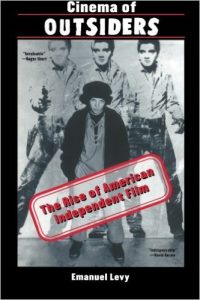Whit Stillman, who made an impressive directorial debut at the 1990 Sundance Film Fest with Metropolitan, is a major talent to watch: A new auteur with distinctive voice.
As producer, director, and screenwriter of Metropolitan, a wry accomplished comedy about young Manhattan debutantes, Stillman made a handsome film for the astonishing amount of $230,000.
How he did it?
He shot the entire movie in his hometown, New York, and cajoled friends and relatives to invest money in his production, before shooting several scenes in borrowed apartments of acquaintances.
Things were very different for Stillman with Barcelona, his second movie and a most respectable follow-up to his debut. Castle Rock (the company that made such smash hits as When Harry Met Sally, A Few Good Men, City Slickers) was so awed with Metropolitan that it gave him carte blanche–4 million dollars budget and complete artistic freedom–the dream of every young filmmaker.
The bigger budget allowed Stillman to shoot his movie in an exotic place, the ravishing, and cosmopolitan Barcelona, the Catalan Mediterranean city known for its broad boulevards, grand plazas, and wildly varied architecture.
Stillman’s greatest achievement is that neither Metropolitan nor Barcelona are exactly high-concept project. The story of his new movie defies easy definition: It’s a subtle comedy about two American men in their late 20s, a businessman and a naval lieutenant, both working in Spain in the early l980s, which is described as “the last decade of the Cold War.”
Thematically, the new film is similar to Metropolitan, as the eternally bickering duo of Ted and Fred must confront moral choices about love and career, and the personal and political issues are played against a backdrop of anti-Americanism and terrorists’ attacks.
Talk about being different: Barcelona has no sex, no violence, no special effects, not even conventional storytelling. But what Stillman’s movie has going for it is wit, intelligence, charm–and lots of talk. The talk about friendship, commitment, and affairs of the heart may remind you of the work of French director Eric Rohmer or perhaps even Woody Allen.
Woody Allen’s movies come to mind as Metropolitan’s WASPish protagonists are unabashedly creatures of Manhattan’s Upper East Side: They meet in the lobbies and ballrooms of the Plaza and St. Regis hotels and in Protestant cathedrals.
Stillman’s witty comedies also lack star power–bankable actors in Hollywood’s jargon. The leading roles of Ted and Fred are played by Taylor Nichols and Christopher Eigeman, two appealing but largely unknown actors who were also featured in the ensemble cast of Metropolitan.
The style is undeniably verbose; Stillman’s pictures are all language, all dialogue. As in Metropolitan, the audacious director has chosen for his protagonists characters who on the surface don’t seem likable: an American sales executive and a naval lieutenant with the Sixth Fleet! They are also a bit ridiculous and self-absorbed, though Stillman manages to humanize them.
In the l990 film, Charlie Black (Nichols) constantly talks social theory and makes sweeping generalizations; he is convinced that his class of people, the UHBs (acronym for urban haute bourgeoisie) is doomed. The Ted of Barcelona is also given to odd theories that fail to stand the reality test. And Eigeman’s Fred has a tendency to spin extravagantly false tales, hoping that their sheer audacity will convince others; he too is an extension of the sharp-tongued Nick of Metropolitan.
Stillman conceives of Barcelona as a more “acid” film than Metropolitan, because of the element of real terrorism in the story. He claims he wanted to make an entertaining film that is “darker, with black colors.” In a recent interview, Stillman humorously described Barcelona as “Metropolitan meets Where the Boys Are meets The Year of Living Dangerously.”
Barcelona was shown in the Cannes Film Festival’ market; it was not accepted by any of the official sections. Word-of-mouth after the first screening was so strong that we all rushed to see it in its second showing. After its official world premiere in June, at the 1994 Seattle Film Festival, Fine Line decided to distribute Barcelona in he heat of the summer–a gutsy decision that might pay off, for the film may appeal to intelligent filmgoers who are starved for fare with substance, after having been saturated with big-budget, mindless, special-effects movies for months.











